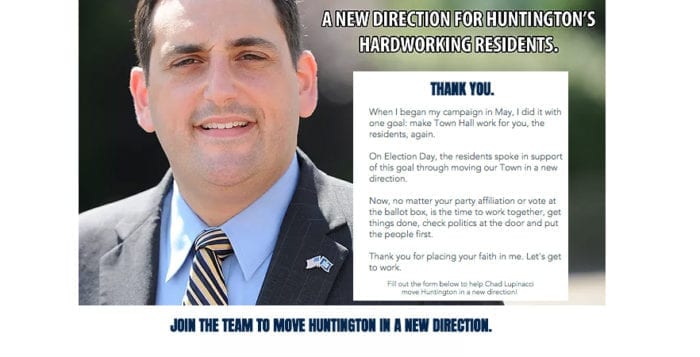The Town of Huntington’s first major change of leadership in more than 20 years is getting underway.
Huntington’s Supervisor-elect Chad Lupinacci (R-Huntington Station) announced the launch of the New Direction Transition Team website Nov. 30, for individuals interested in applying for town personnel openings during the transition period.
“In an attempt to keep the hiring process transparent and evaluate all options in personnel matters, I have launched the New Direction Transition Team website,” Lupinacci said in a press statement.
The website, www.Chad2017.com, was inspired by similar ones constructed by recent presidential administrations and Nassau County Executive-elect Laura Curran (D), according to spokesman Brian Finnegan. Those interested may submit a cover letter and resume, then select from more than 15 town departments for which they are interested in working. There are no plans at this time to list specific job openings or descriptions, according to Finnegan. Applicants will not be asked for their political party affiliation.
“Regardless of party affiliation, the supervisor-elect plans on vetting and considering all qualified candidates based on merit,” Finnegan said. “He takes great pride in the fact he’s worked beneath several bipartisan administrations.”
At the town’s unveiling of Huntington Station community center plans Nov. 25, Lupinacci spoke about how his first public service position was working as a laborer under former town Highway Supervisor William Naughton (D). He left the town to become a communications liaison for late Republican State Assemblyman Jim Conte, who represented the 10th district for 24 years. Lupinacci was elected to his first political office in 2012, when he took over Conte’s vacated seat.
“Now, no matter your party affiliation or vote at the ballot box, is the time to work together, get things done, check politics at the door and put people first,” reads Lupinacci’s transition website.
The state assemblyman defeated Councilwoman Tracey Edwards (D) receiving nearly 54 percent of the votes. He takes office Jan. 1 from resigning Supervisor Frank Petrone (D).
Lupinacci’s move back to town government will leave an open state assembly seat for 10th district residents, which spans from Lloyd Harbor south along state Route 108/Plainview Road to SUNY Farmingdale State College, and as far east as Elwood. It is unclear who will take his place as Lupinacci’s term doesn’t expire until Dec. 31, 2018.
“Shortly after the first of the year we will have a screening process to interview potential candidates to fill that seat,” said Toni Tepe, chairwoman of the Huntington Republican Committee.
Under New York State Senate law pertaining to public officers, “A special election shall not be held … to fill a vacancy in the office of state senator or in the office of member of assembly, unless the vacancy occurs before the first day of April of the last year of the term of office. … If a special election to fill an office shall not be held as required by law, the office shall be filled at the next general election.”
Tepe said the decision on whether or not a special election will be held to fill Lupinacci’s state office will ultimately be made by state Gov. Andrew Cuomo (D).





